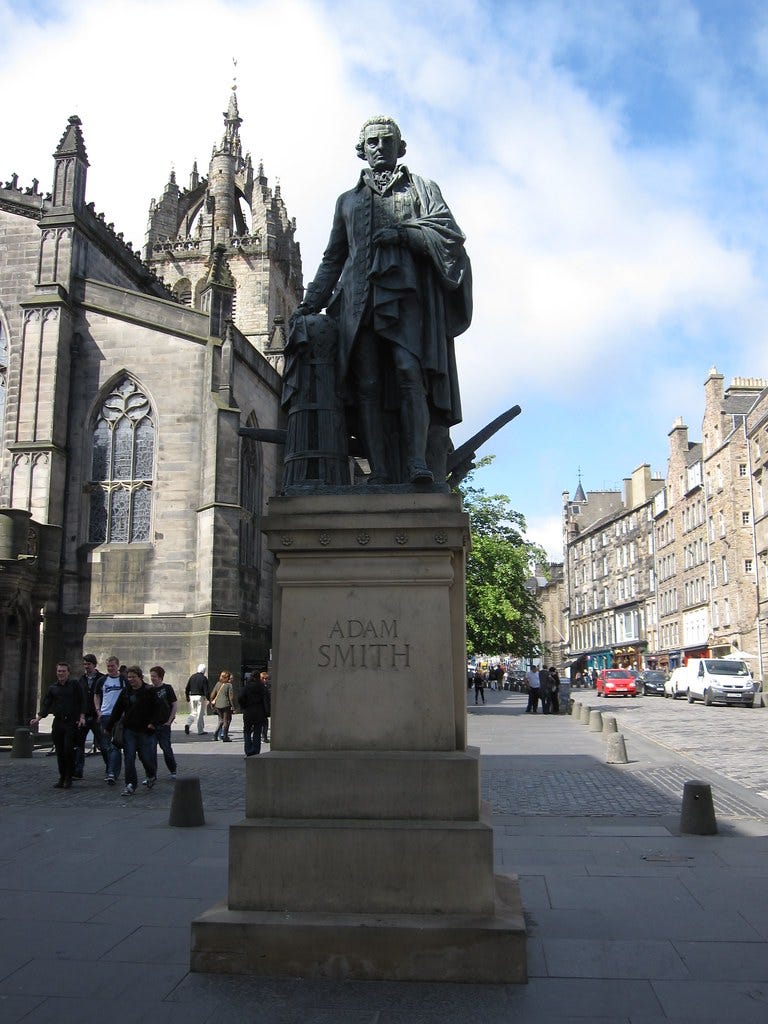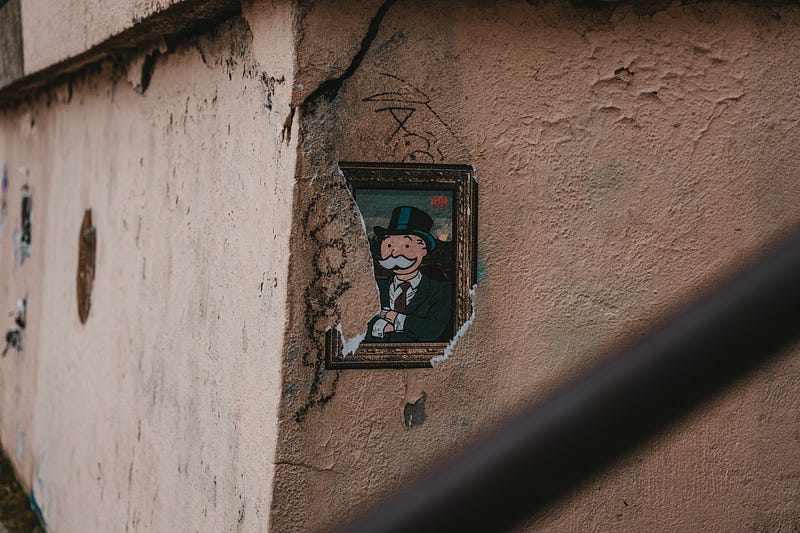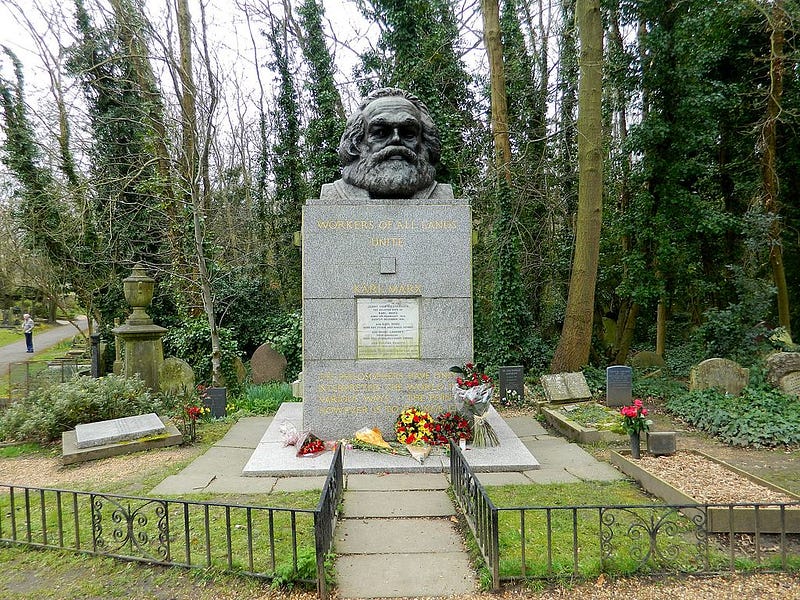Part 1 of a Discussion of Peter Foster’s Why We Bite the Invisible Hand Chapter 2 “The Sage of Kirkcaldy”
In this chapter, Peter Foster follows Adam Smith through the years as he developed his ideas that were enshrined in his two books, The Theory of Moral Sentiments in 1759 and The Wealth of Nations in 1776.
Foster also describes how Smith is thought of by the people he interacts with in the UK as he visits Smith’s grave.
I will tackle the first part this week and maybe that will add some ironic depth to the second part the next week.
Adam Smith’s Early Years
Smith was born in 1723 in Kirkcaldy, Scotland, that was a prosperous town at that time. (p. 41) Smith’s father, a successful lawyer and government official, died before he was born, but left him and his mother financially comfortable. (p. 41)
Smith was born at the time of the Scottish Enlightenment, which meant the prevailing belief was human reason would be able to determine a science of human nature.
For Smith, this helped set his primary interest: “analyzing how human institutions and government policies might help or hinder the material — and moral — advancement of individuals and society.” (p. 41)
His first book focused more on the morality and psychology of human behavior, which he wrote while a professor at the University of Glasgow. (p. 43)
In a review, Edmund Burke, the great conservative thinker and politician, wrote, “It certainly shows the author to have been a man of uncommon observation, not only of his own mental states, but of the life and ways of men about him.” (p. 43)
One outcome of the book was it attracted the attention of another prominent politician, Charles Townshend who eventually convinced Smith to go on an educational tour with his stepson, the Duke of Buccleuch. This turned out to be significant for Smith because of the contacts he made on the trip as well as the fact it came with a lifetime pension that would allow him to focus on his writings. (p. 44)
Smith intended his second book to be about government but apparently felt he could not write about policy without first investigating how economics works. (p. 44)
This is a lesson that has — astonishingly — been persistently neglected ever since. A thorough understanding of economics is not merely an option for politicians and political advisors, it is essential. One problem may be that many politicians and advisors are inclined, by the nature of their activist aspirations, not to like what economics has to tell them. (p. 44)
Touché, Foster.
The Wealth of Nations
While on the grand Continental tour, Smith rubbed elbows with the great thinkers of the day in the French salons including Voltaire, Francois Quesnay and the physiocrats, and other philosophers. (p. 44)
I have to admit I had never heard that Smith and Quesnay interacted. In fact, I had never heard of the physiocrats until I started using A Little History of Economics in a class a few years ago to give us all a background in economic history to understand the textbook better.
The physiocrats were one of the early groups to realize the feudalist system in France that heavily taxed the farmers disincentivized production. It was a dangerous theory to put forth because it led to the politically risky conclusion that the aristocrats should be paying taxes.
Smith admired Quesnay but disagreed fundamentally with the physiocrats’ now strange-seeming view that land and agriculture are the sole source of a nation’s wealth. He also rejected Quesnay’s view that economics could be turned into an exact mathematical science. (p. 45)
It is true that the physiocrats incorrectly thought that manufacturing added no value, but that could have helped Smith crystalize his own thoughts on what does contribute to the wealth of nations as he ultimately writes in his later book.
Smith is most known for the metaphor of the invisible hand that is mentioned in The Wealth of Nations, but it is often not well understood.
Smith believed human nature wanted to better itself and a free market worked best at channeling that self-interest in a direction that led to serving others as shown in the most famous quote from that book.
“It is not from the benevolence of the butcher, the brewer, or the baker that we expect our dinner, but from their regard to their own interest.”
He wasn’t suggesting that butchers, brewers and bakers lacked the milk of human kindness, or a sense of family, of community; just that — when it came to commercial relationships — we had to recognize how much systematic good was done by allowing free rein to self-interested voluntary exchange. (p. 47)
Self-interest is often misunderstood today to be a synonym to selfish. Instead, we better grasp Smith’s meaning if we pair the ideas from this book with those of his first book where he lays out what it means to be moral so that a person could find happiness.
Foster quotes Andrew Skinner, an expert on Smith’s work who edited an edition of The Wealth of Nations and taught at the Adam Smith Institute. Skinner rejects the idea that Smith was a free-market advocate like Milton Friedman and the Chicago school of the 1980s.
“The Wealth of Nations” and “The Theory of Moral Sentiments” are complementary,” he said. “Smith is really pointing out that our psychology is complex, that we are driven by a number of motives…The butcher, brewer, and baker all have social contacts and family contacts. Their economic behavior is not driven by self-interest narrowly defined…All economic activity for Smith is social activity. He doesn’t treat man as an isolated atom.” (p. 61)
As discussed in my blog on the first chapter, Smith was a virtue ethicist. While he believed prudence, which is a regard for self-interest, is a virtue, it was not the only virtue. Justice, temperance, and others play a role in a balanced life for someone who wants to be happy.
Smith is also often misconstrued as someone who wants no government, but most of his critiques of government were coming from his critique of the mercantilist system of his day.
Mercantilism was the system that rose up after feudalism and it was an economic policy that created an alliance between a strong government and the merchant. It relied on tariffs to protect industries rather than allowing free trade based on which county could most efficiently produce a good.
Smith was not arguing for no government but he was pointing out where government interference was making the economy less efficient.
Smith’s selling point for governments was that by interfering less, they would in fact promote economic growth and thus enhance their revenues. (p. 49)
Conclusion
Like Foster laid out in his opening chapter about how people misconstrue capitalism into a caricature of a system that leads to exploitation and putting money ahead of everything, Smith’s reputation is similarly shallow and fallacious.
Smith did not care only for the virtue of self-interest to the exclusion of all other virtues. Nor did he think there was no role for government.
These are two of the criticisms attached to more modern day politicians like Ronald Reagan and Margaret Thatcher.
Capitalism, Smith, Reagan and Thatcher are all turned into one-dimensional cardboard cutouts by the Marxist view that dominates the subtext of our culture, which is why in the next blog Foster runs into few people in the UK who will publicly support Smith.
It is bad enough to be unloved in your home country, but it is even worse when the reasons given about your and your beliefs are not even correct.
Reference: Foster, Peter, 2014. “The Sage of Kirkcaldy” Chapter 2 of Why We Bite the Invisible Hand, Pleasaunce Press.




